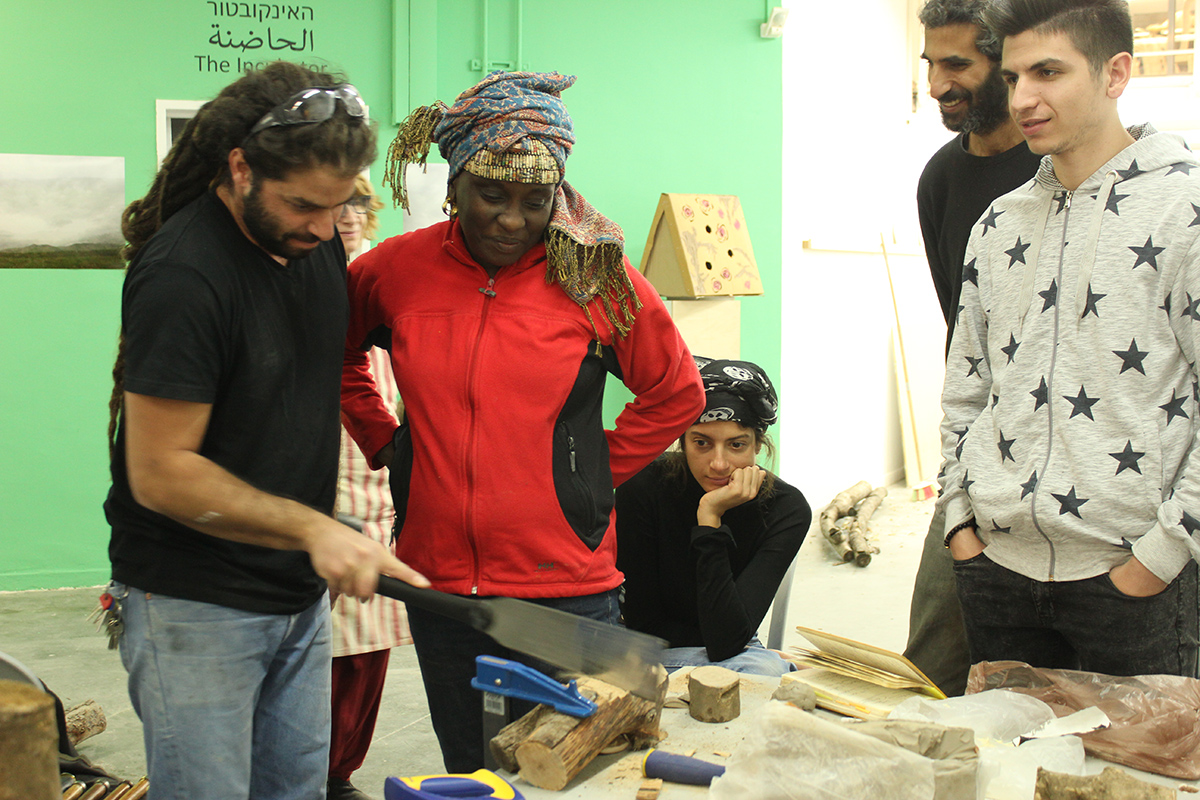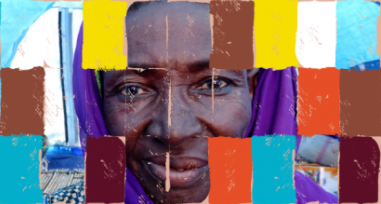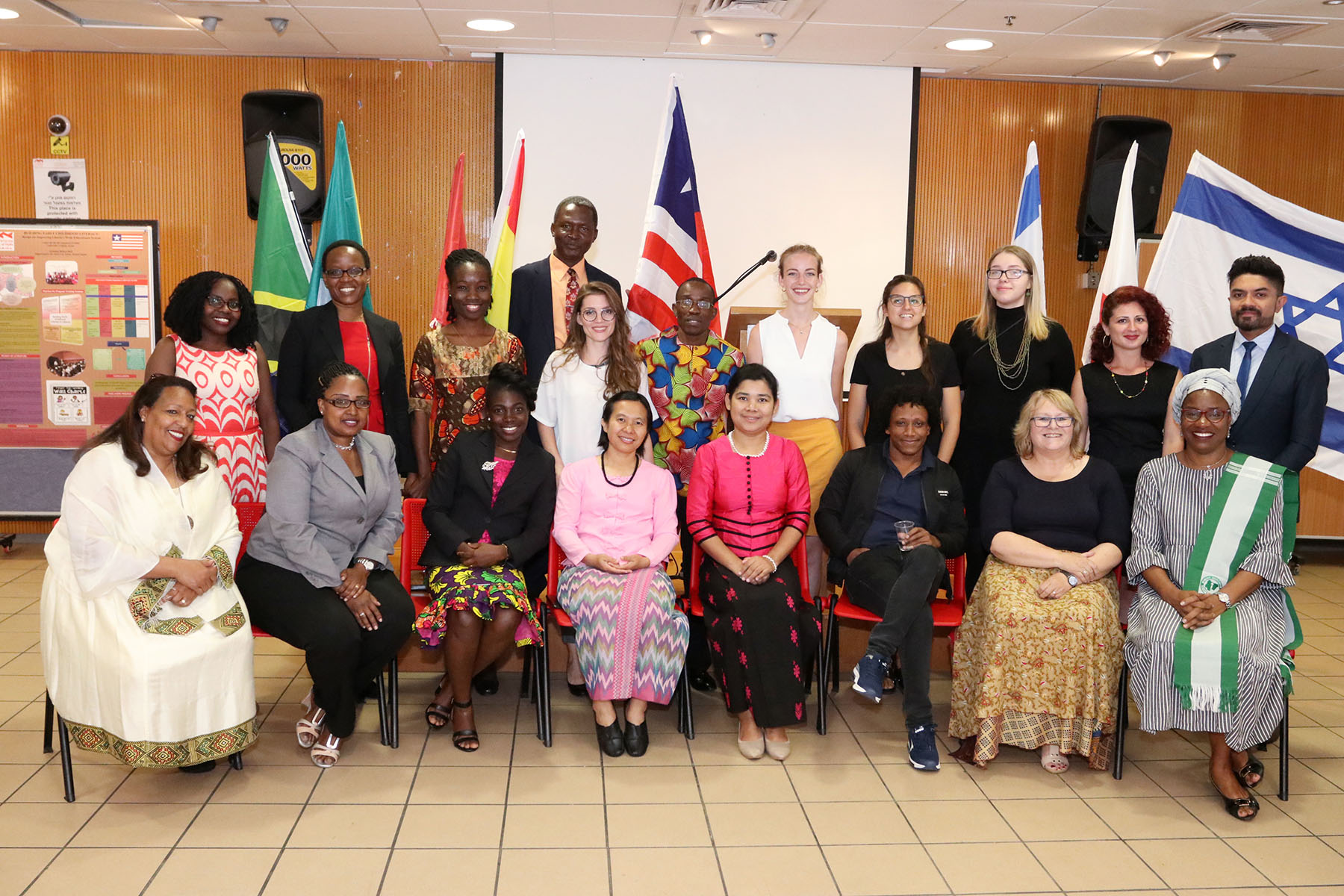Africa Awareness
We fund a number of academic programmes at Israeli universities, with a focus on encouraging exchange between Israel and Africa.
Art Academies Exchange (CoCuDi Center)

As part of its roster of creative and educational cross-cultural programmes, the CoCuiDi Center is facilitating an exchange between the Ceramics and Glass Department at Bezalel Academy in Jerusalem and the Margaret Trowell School of Industrial and Fine Arts at Makerere University in Kampala. The programme allows participants to exchange knowledge and technical expertise while introducing them to each other’s cultures in a creative and collaborative setting. Anatta is delighted to support this development of the next generation of Israeli and Ugandan artists, and the enrichment of both societies through mutual learning and an active commitment to cross-cultural respect, understanding and cooperation.
The Tamar Golan Africa Center at Ben Gurion University

The Tamar Golan Africa Center was established in 2009 by the late Dr. Tamar Golan at Ben-Gurion University of the Negev, with the aim of promoting and developing the field of African studies and multidisciplinary research on Africa in Israeli academia. As part of an engaged and active campus, the Center encourages undergraduate and graduate students in African Studies to move beyond a purely academic perspective and also engage with the political, social and cultural challenges facing the continent by initiating volunteer activities on campus, in the community and the African continent. The Center supports two academic programs in African Studies (BA and MA) that offer a wide range of courses in the fields of history, politics, culture, geography, art, religions, economics and development. The Centre holds academic and social conferences and events on campus throughout the academic year, with the aim of expanding and deepening the fields of knowledge on the continent of students and faculty members.
The program encourages that any community interventions, whether in social, cultural or more applied areas of science, agriculture or economics, reflect knowledge of history, politics, economics, social and cultural studies. The program encourages students to adopt a broader and more sustainable approach, to search for innovative approaches and to understand and weave these into community life.
Anatta began contributing to Central Africa (and thus to the undergraduate program in African Studies) from its establishment in 2009. The donation include daily operations of the Africa Centre, as well as the Inter-University Undergraduate Program in African Studies, and the Master's Program in Sustainable Communities in Africa. The donation facilitates international academic conferences, advances academic research through research grants to students and faculty, study tours throughout the African continent and in Israel, funding academic courses, publishing the book series "Now Africa" in cooperation with Pardes Publishing, and more. In addition, the Anatta Foundation's donation to the Master's Degree in Sustainable Communities in Africa enables African students to be brought to Israel to study in the program. The donation funds the tuition, housing, and living expenses of students in Israel during their studies.
GLOCAL at the Hebrew University

The Glocal Program for International Development at the Hebrew University is an international master's program for studying community development. The program translates academic research and theoretical knowledge into practical understanding and practices, in an approach that encourages underserved communities around the world to thrive and succeed.
The program focuses on international development from a local perspective and gives students tools and knowledge to create sustainable solutions together with local communities. The program includes four months of practical internship in organisations that assist disadvantaged communities in Africa, Latin America and Southeast Asia, as well as in Israel and the Palestinian Authority. The program enables specialisation tracks in gender and migration as well as a research track. Graduates of the program work in a variety of organisations and companies in the field of community development and international development in Israel and around the world.
The Anatha Foundation has supported the Glocal program since 2014, through scholarships for African students, scholarships to support internships in organisations in Africa and research relating to the continent, as well as the overall activities of the program.
Child Development for Developing Countries, University of Haifa

Child Development for Developing Countries, University of Haifa
The field of early childhood education and development is gaining increasing interest in north America, western Europe and Israel, reflected in a significant increase in the number of graduate programs over the past decade. However, the possibilities for students from developing countries to study the field in the context of their unique cultural, social, and educational frameworks are very limited.
The University of Haifa, the first and only University in Israel to champion the United Nations Sustainable Development Goals (SDGs), launched the Interdisciplinary Master's Degree Program in Early Childhood Education and Development in Developing Countries. The program trains the next generation of early childhood experts from developing countries, who will become agents of change and contribute to improving the lives of children in these countries, as part of a general need to improve by impact. The curriculum is based on a global perspective and collaboration with renowned experts from all over the world. The program is conducted in English, and it bridges research and practice holistically to improve the lives of disadvantaged and vulnerable children around the world. In the spirit of the program's multidisciplinary policy, the student group represents a diverse spectrum of professions including: early childhood education, special education, psychology, social work, nursing, paediatrics, public policy, Public policy, and more – all are eager to make a difference. With the assistance of Anatta, the pioneering program in child development was conducted with great success between 2014-2020 at the Faculty of Social Sciences, with the last cohort having to deal with the COVID-19 pandemic. As a result, the program was put on hold, leaving a void in our ability to make an impact in these parts of the world.
With the renewed and generous assistance of Anatta, the activity will be renewed this year as part of the interdisciplinary Master's degree program in Early Childhood Education and Development at the Faculty of Education. The screening process, which included more than 100 candidates, is currently being completed. The upcoming class in October 2023 will be joined by about 20 students who will come to Haifa from a variety of countries: Ethiopia, Ghana, Georgia, India, Honduras, the Philippines, Ivory Coast, Tanzania, Liberia, Myanmar, Nepal, the Democratic Republic of the Congo, Kenya, and more.
Israel Uganda Art Academies exchange program

The Israel Uganda Art Academy Exchange Program has been operating since 2018, in partnership with the Bezalel Department of Ceramics and Glass, the Department of Textile Design at Shenkar, and the School of Art at Makerere University (Uganda). The program, established and managed by the African Studies Gallery and CoCuDi Center is supported by Anatta. The program enables an unmediated encounter between students and faculty members on a variety of levels (professional, educational, artistic, cultural and personal), resulting in in-depth dialogue and fruitful cooperation. This includes residency for lecturers and graduate students for a period ranging from one month to one year, intensive courses, workshops, internships for students, and joint academic courses. As of 2020, digital and hybrid courses are held. As part of the program, there are collaborations between other cultural and artistic entities in order to encourage the encounters between the general public and particular artists. Among other things, lectures and workshops were held at the Israel Museum, Beit Binyamini, the New Gallery in Jerusalem, the African Studies Gallery and more.
As part of the program, between 2018-2021, junior faculty members and graduate students at Makerere University came for a one-year stay in the Department of Glass and Ceramics Design at the Bezalel Academy of Art. During the year, they served as teaching assistants, took part in the department's studies, and participated in a joint departmental seminar for Israeli and Ugandan students to adapt production technologies to the existing conditions and materials in Uganda. Thus, the students managed to set up a kiln in the Bezalel courtyard that would allow glass to be melted at a temperature of 1000 degrees. In addition, a collaboration was established with the Department of Chemistry at the Hebrew University in an attempt to find local substitutes for silica production. Among other things, the possibility of producing silica from banana leaves is being examined.
Alongside the participants in the long-term residency program, senior artists, heads of various departments, an artists came to stay every year for a period of one month during which they gave workshops and lectures at Bezalel, the Israel Museum, Haifa University, Tel Aviv University, Beit Binyamini and many other places, drawing inspiration for their personal work and teaching methods in Uganda. At the same time, students from Bezalel traveled to Makara University for a two-month internship. The head of the department and the director of the ceramics workshop also traveled to Uganda for two weeks to give a workshop to students at the Makara University School of Art. The COVID-19 years presented the program with new challenges, but in retrospect, these challenges opened up endless possibilities for knowledge sharing and expanding the number of students who benefit from shared learning and mutual acquaintance.
Semester courses that are taught on Zoom from Uganda to Israel and vice versa were opened, as well as courses for joint learning, usually in pairs composed of an Israeli and Ugandan student. This teaching method enabled a deeper study of materials and techniques and greater adaptation to the living environment of the student studying. For example, a course in wood carving was given by Dr. Lilian Namtoba, head of the sculpture department at Makerara, to Bezalel students who were exposed for the first time to work with wood, and a course in theory and art criticism taught by Dr. Eran Erlich, head of the Department of Glass and Ceramics Design at Bezalel, to graduate students at Makerara.
Distance learning has also opened the possibility of collaboration between the Department of Textile Design at Shenkar College and the Department of Fashion and Textiles at Makerere University. It was decided to study about bark a Ugandan traditional material and joint study groups explored this challenging and thought-provoking ecological material. Due to the success of the collaboration, during the current academic year, a fashion designer and research lecturer from Makerere University, specializing in bark textiles, came to Israel for a month-long stay to conduct workshops at Shenkar, in addition to lectures and experiential meetings at Ben-Gurion University, a community center in Jaffa and the Hebrew University's Glocal program.